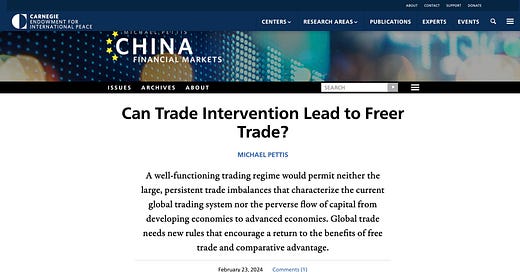Recasting the global economic system
A brilliant analysis of the fix we're in, and the solution we seek
Fascinating Carnegie Endowment piece by Michael Pettis calling into question the current structure of the global economy.
The driver for this re-evaluation seems clear enough, as these two senior World Bank officials (another piece in Barron’s) note, the world is in danger of seeing aggregate growth drop to nearly zero due to the current wave of populism.
At first blush, you want to blame the friction (populism), but the real force arrives in the form of the global economy’s plate tectonics — how things have shifted over time, creating enormous politics-tilting pressures. This is what Pettis seeks to address.
His upfront summary (see above) nails the core details.
Trade balances, I only know so much about it, other than the big danger seems to be debtor nations becoming excessively financialized (full of financial trickery that yields wealth only for a fraction of the populace). I get the latter point; I just don’t have any great sense of a way forward, so I was very excited to see Pettis’s piece.
What really grabbed my attention is the brain-drain-like perversity of net capital flows from developing to advanced economies. Like when talent moves in the wrong direction (brain drain from those nations with too few to those with plenty), this just seems both cruel and counter-productive: shouldn’t that local money be sticking around for the higher profits to be found in an emergent global majority middle class centered increasingly in those developing economies? Isn’t that the most logical and beneficial outcome for the global economy as a whole?
Keep reading with a 7-day free trial
Subscribe to Thomas P.M. Barnett’s Global Throughlines to keep reading this post and get 7 days of free access to the full post archives.




